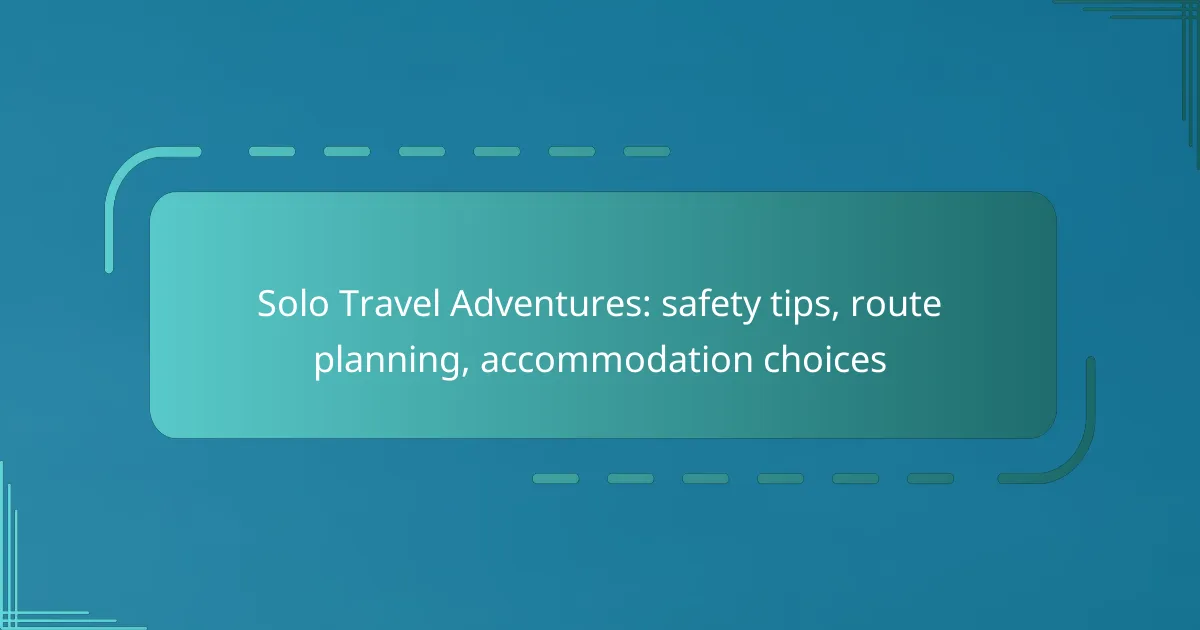Embarking on a solo travel adventure can be both exhilarating and daunting, making safety a top priority. By implementing essential safety tips, carefully planning your route, and choosing the right accommodations, you can enhance your experience and explore new destinations with confidence. Whether you’re navigating bustling cities or serene landscapes, a thoughtful approach will ensure your journey is both enjoyable and secure.
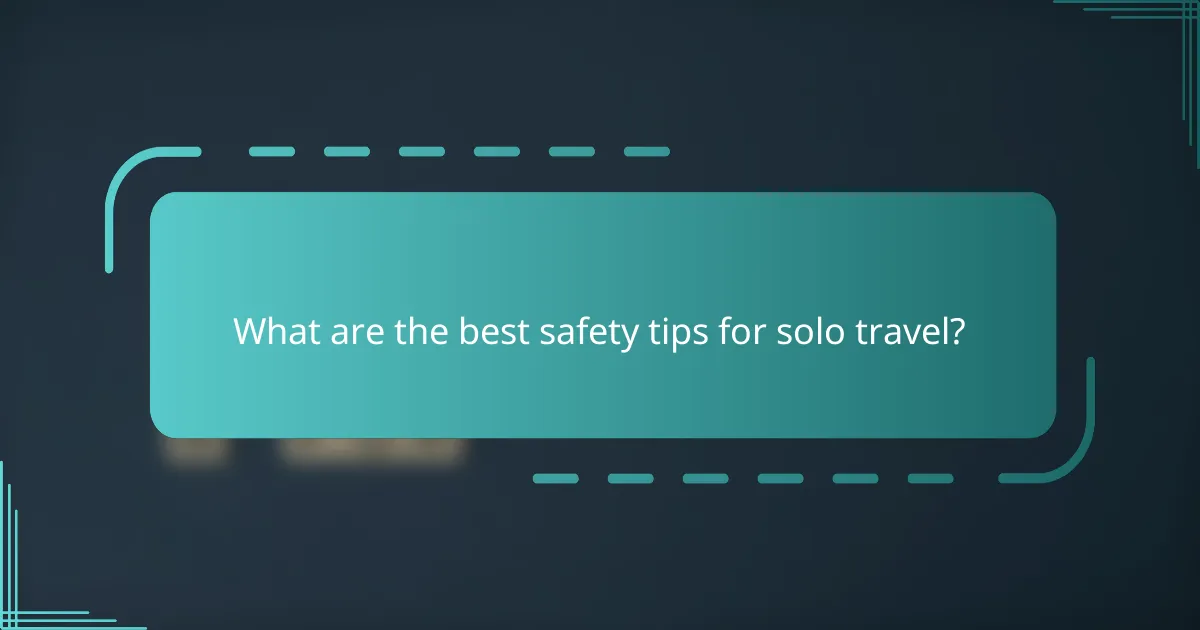
What are the best safety tips for solo travel?
The best safety tips for solo travel focus on staying vigilant, using trusted services, and being prepared for emergencies. By following practical guidelines, solo travelers can enhance their safety and enjoy their adventures with greater peace of mind.
Stay aware of your surroundings
Being aware of your surroundings is crucial for solo travelers. Always pay attention to the people and environment around you, especially in crowded places or unfamiliar areas. Avoid distractions like excessive phone use when walking.
Consider using a discreet bag or pouch for valuables, and keep it close to your body. If you feel uncomfortable in a situation, trust your instincts and leave the area.
Use reputable transportation options
Selecting reliable transportation is essential for safety while traveling alone. Opt for well-known taxi services, rideshare apps, or public transport that has good reviews. Research local transportation options before your trip to understand which are safest.
Avoid accepting rides from strangers or unlicensed taxis, as these can pose risks. If using public transport, keep your belongings secure and be cautious during late-night travel.
Keep emergency contacts handy
Having emergency contacts readily available can be a lifesaver during solo travel. Store important phone numbers, such as local emergency services, your country’s embassy, and trusted friends or family, in your phone and on a physical card.
Familiarize yourself with local emergency protocols and know how to reach help quickly. In case of an emergency, having these contacts can provide immediate assistance and peace of mind.
Secure your belongings
Protecting your belongings is vital for solo travelers. Use anti-theft bags or backpacks with lockable zippers to deter pickpockets. Always keep your valuables, such as passports and money, in a secure location.
When staying in accommodations, use hotel safes or lock your luggage when you leave the room. Be cautious when displaying expensive items in public to avoid attracting unwanted attention.
Research local customs and laws
Understanding local customs and laws can enhance your safety while traveling alone. Research cultural norms, dress codes, and behaviors that are considered respectful in the destination you are visiting.
Being aware of local laws, especially regarding alcohol consumption, photography, and public behavior, can help you avoid legal issues. This knowledge also aids in blending in and respecting the local culture, making your travel experience smoother and safer.

How to plan a solo travel route?
Planning a solo travel route involves selecting destinations, determining the best means of transportation, and creating a flexible itinerary that prioritizes safety and enjoyment. A well-thought-out route can enhance your experience and help you navigate new places with confidence.
Utilize travel planning apps like Google Maps
Travel planning apps such as Google Maps are essential for navigating unfamiliar areas and finding points of interest. These apps allow you to search for attractions, restaurants, and accommodations, while also providing real-time directions and estimated travel times.
Consider downloading offline maps in case you lose internet access. This feature can be particularly useful in rural areas or regions with limited connectivity.
Consider popular solo travel destinations
Choosing popular solo travel destinations can enhance your experience due to the availability of resources and a welcoming atmosphere. Cities like Barcelona, Tokyo, and Lisbon are known for their vibrant cultures, safety, and ease of navigation.
Research destinations that cater to solo travelers, as they often have hostels, guided tours, and social activities designed to foster connections among travelers.
Incorporate flexibility in your itinerary
Flexibility in your travel itinerary allows you to adapt to unexpected changes or opportunities. While having a general plan is important, leave room for spontaneous adventures, such as local events or recommendations from fellow travelers.
Consider using a mix of planned activities and open days to explore at your own pace. This balance can lead to a more enriching travel experience.
Identify safe neighborhoods
Researching safe neighborhoods is crucial for solo travelers to ensure a secure and enjoyable experience. Look for areas with good reviews from other travelers, low crime rates, and accessible public transportation.
When you arrive, take the time to familiarize yourself with your surroundings. Local resources, such as tourism offices or online forums, can provide valuable insights into which neighborhoods are best for solo travelers.
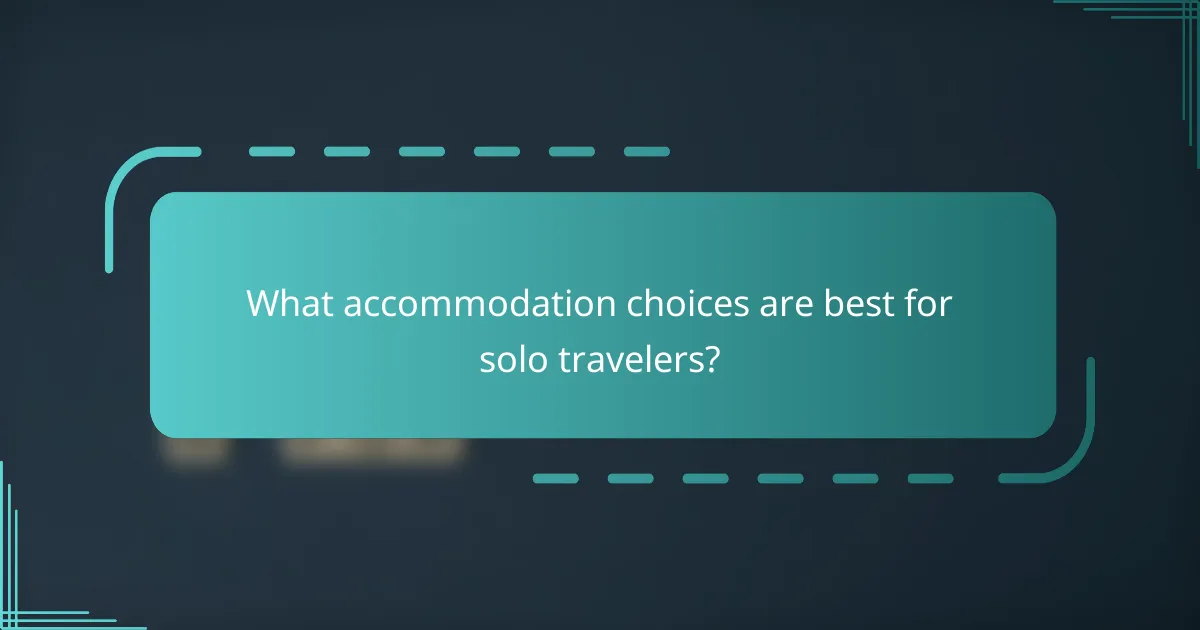
What accommodation choices are best for solo travelers?
Solo travelers should prioritize accommodations that enhance safety, comfort, and social interaction. Options like hostels, well-reviewed hotels, vacation rentals, and co-living spaces cater to various preferences and budgets.
Hostels for social interaction
Hostels are ideal for solo travelers seeking social connections. They often feature shared dormitories and communal areas, encouraging interaction among guests. Many hostels organize group activities, making it easier to meet fellow travelers.
When choosing a hostel, look for those with good reviews on safety and cleanliness. Websites like Hostelworld or Booking.com can help you find reputable options in your destination.
Hotels with good reviews for safety
Hotels that receive positive reviews for safety are a reliable choice for solo travelers. Look for accommodations that offer 24-hour reception, in-room safes, and secure access to rooms. Checking recent guest reviews can provide insights into the hotel’s safety measures.
Consider mid-range hotels or boutique options that often combine comfort with a welcoming atmosphere. Brands like Marriott or Hilton typically have established safety protocols, making them trustworthy choices.
Vacation rentals for privacy
Vacation rentals, such as those found on platforms like Airbnb or Vrbo, offer privacy and a home-like environment. This option is perfect for solo travelers who prefer to have their own space while exploring a new area. You can often find rentals that are centrally located and equipped with essential amenities.
When booking a vacation rental, check the host’s ratings and read previous guest comments to ensure a safe and pleasant experience. Look for properties with flexible cancellation policies for added peace of mind.
Consider co-living spaces
Co-living spaces are an emerging trend that combines private living with communal facilities. These accommodations often attract like-minded individuals, providing opportunities for networking and socializing. They typically include shared kitchens, lounges, and organized events.
Co-living can be a cost-effective option, especially in urban areas. Research local co-living providers and read reviews to find a space that aligns with your lifestyle and safety preferences.
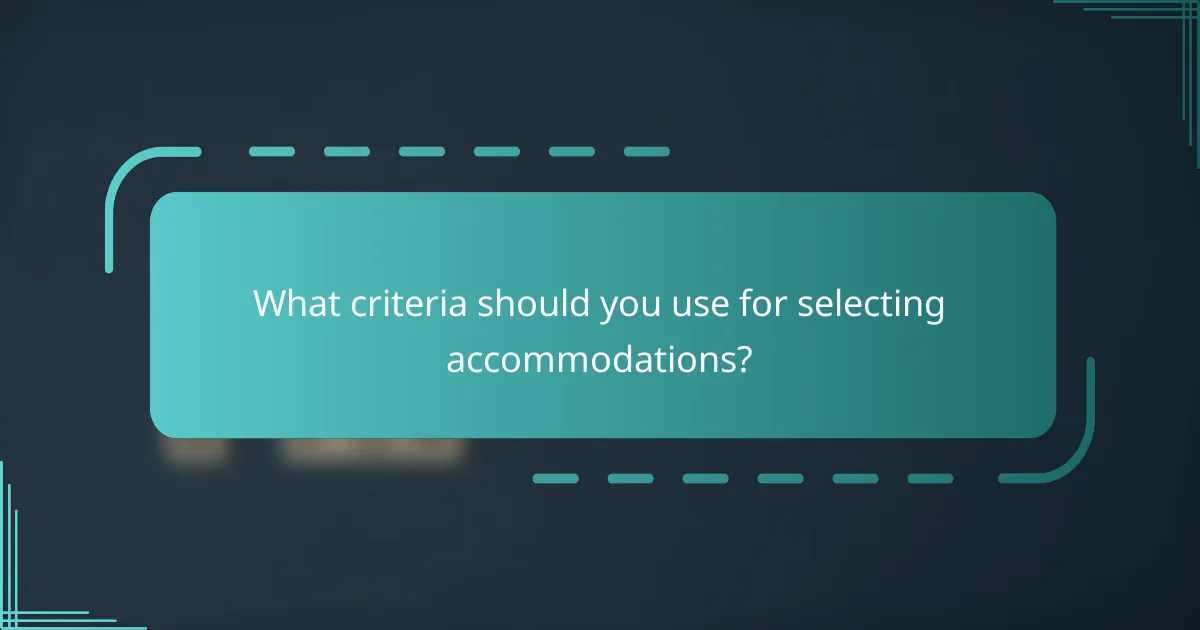
What criteria should you use for selecting accommodations?
When selecting accommodations, prioritize safety, location, and amenities that meet your travel needs. Consider factors such as reviews, proximity to attractions, and available services to ensure a comfortable stay.
Check safety ratings and reviews
Safety ratings and reviews are crucial for ensuring a secure stay. Look for accommodations with high ratings on trusted platforms, as they often reflect the experiences of previous guests. Pay attention to comments regarding security measures, such as 24-hour reception and surveillance systems.
Consider using websites that aggregate reviews from multiple sources to get a comprehensive view. Aim for properties with a significant number of reviews, as this can provide a more reliable assessment of safety and quality.
Evaluate location convenience
Location convenience can greatly enhance your travel experience. Choose accommodations that are close to public transportation, major attractions, and essential services like grocery stores and restaurants. This can save you time and money during your trip.
Use mapping tools to assess the distance from your accommodation to key points of interest. A central location may cost more, but it can reduce travel time and enhance your overall enjoyment. Always check local transport options to ensure easy access to the areas you plan to explore.
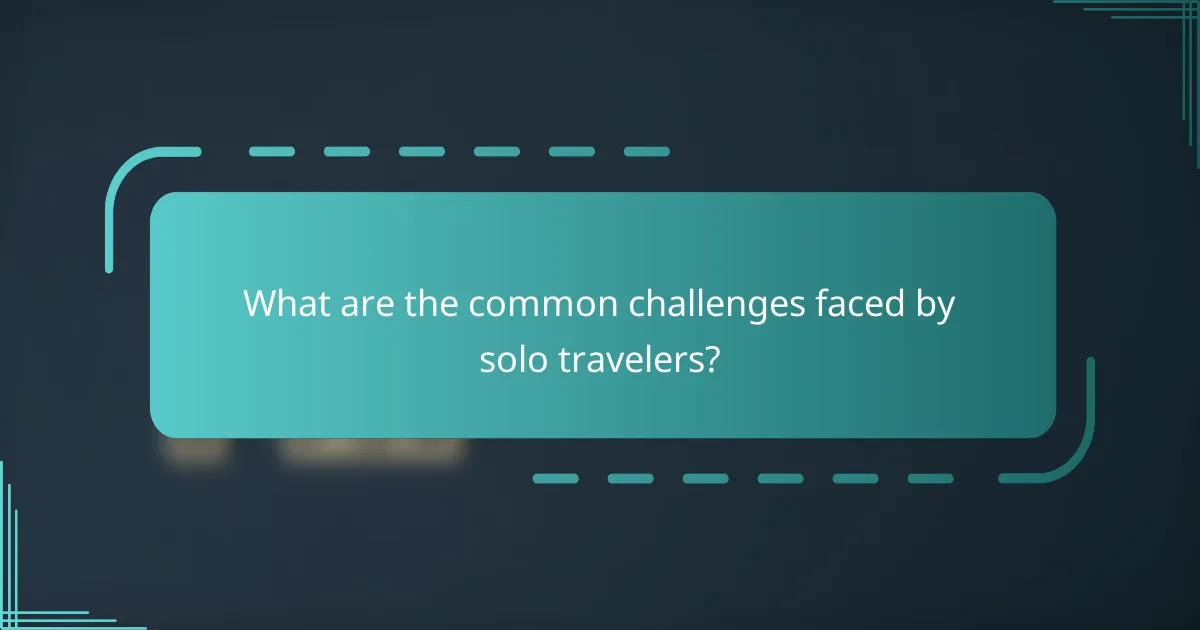
What are the common challenges faced by solo travelers?
Solo travelers often encounter challenges such as safety concerns, loneliness, and logistical issues. These can impact the overall experience and require careful planning and awareness to navigate effectively.
Safety concerns
Safety is a primary concern for solo travelers, as they may be more vulnerable to theft or scams. It’s crucial to research the destination beforehand, understanding local customs and areas to avoid. Carrying minimal cash and using secure payment methods can enhance personal safety.
Staying aware of your surroundings and trusting your instincts are essential practices. Consider using a money belt or hidden pouch for valuables, and avoid displaying expensive items. Engaging with local communities can also provide insights into safe practices.
Loneliness and social interaction
Loneliness can be a significant challenge for those traveling alone, especially during extended trips. To combat this, consider staying in hostels or joining group tours to meet fellow travelers. Participating in local activities or classes can also foster connections.
Using social media or travel apps to connect with other solo travelers can provide companionship and support. Setting aside time for reflection while also seeking social opportunities can create a balanced experience.
Logistical issues
Logistical challenges, such as navigating public transport or booking accommodations, can be more complex for solo travelers. Planning routes in advance and downloading offline maps can help mitigate confusion. Always have a backup plan for transportation and accommodation in case of unexpected changes.
When booking accommodations, look for options with flexible cancellation policies. This allows for adjustments if plans change. Keeping essential documents and contacts easily accessible can also streamline the travel process, reducing stress.
